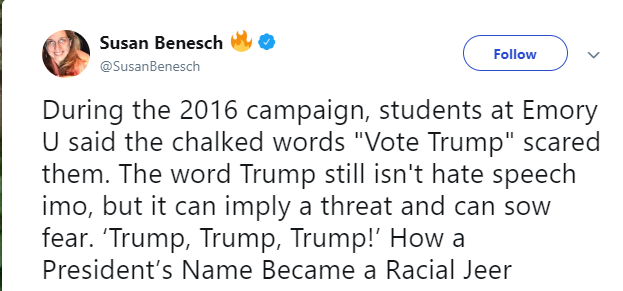Twitter has proposed a new policy to crack down on “dehumanizing speech.” And with a new policy comes a new reference for its actions.
In a Twitter blog post written by Del Harvey, Twitter’s Vice President of Trust and Safety, and Vijaya Gadde, Legal, Policy and Trust & Safety Lead, the social media site prepared to expand its safety policy. “There are still many Tweets many people consider to be abusive, even when they do not break our rules,” they said. The post then proceeded to cite two scholars in order to justify the change: Harvard Director of the Dangerous Speech Project Susan Benesch, and Harvard Professor of Social Ethics Herbert Kelman.

However, a brief glance at Benesch’s Twitter account helps to define what the scholar considers to be “dehumanizing speech”: “During the 2016 campaign, students at Emory U said the chalked words ‘Vote Trump’ scared them. The word Trump still isn't hate speech imo, but it can imply a threat and can sow fear.” The tweet shared a New York Times article, “How a President’s Name Became a Racial Jeer.”
Both Benesch and Kelman have donated to Democrat or left-wing causes, according to OpenSecrets.org. Benesch has given a total of $2,475 to Barack Obama, John Kerry, and Moveon.org. Kelman gave $285 to Barack Obama and Elizabeth Warren.
Twitter gave the terms of its proposed new policy: “You may not dehumanize anyone based on membership in an identifiable group, as this speech can lead to offline harm.” The blog post cited Benesch, saying “Benesch has described dehumanizing language as a hallmark of dangerous speech, because it can make violence seem acceptable.”

Twitter then gave examples of dehumanizing speech: “Examples can include comparing groups to animals and viruses (animalistic), or reducing groups to their genitalia (mechanistic).”
In Wired, Benesch was quoted as saying, “Twitter and other platforms should be careful not to define dehumanization too broadly. For example, it’s tempting to say that any demeaning remark about a group of people, such as ‘the X people are all thieves’ or ‘all corrupt’ is dehumanizing. That one is not dehumanizing, since corruption is a specialty of humans.”
Wired writer Louise Matsakis wanted Twitter to apply this new policy to President Trump specifically, saying, “Twitter may need to decide what to do about high-profile users like President Donald Trump, who once tweeted that Democrats want illegal immigrants ‘to pour into and infest our Country.’”






